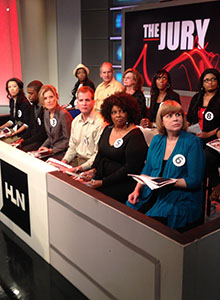Deliberation After Dark
Just before the trial began of a Utah doctor accused of drugging and drowning his wife, Georgia State Law students and a professor were dissecting his case in a mock jury on CNN's HLN network program "HLN After Dark."
 Combing through details and snippets of evidence presented each episode, hosts Vinnie Politan and Ryan Smith charged the mock jurors to weigh in with their verdicts.
Combing through details and snippets of evidence presented each episode, hosts Vinnie Politan and Ryan Smith charged the mock jurors to weigh in with their verdicts.
"This experience made me realize how easily an entire jury can be swayed with mere circumstantial evidence," Saba Daneshvar (J.D. '15) says.
Daneshvar was among those from Georgia State Law who weighed in on the Utah case and others. The Utah case is about Martin MacNeill, a doctor whose wife Michele was discovered dead in a bathtub of their family home in 2007. He is charged with first-degree murder and faces life in prison if convicted.
Other Georgia State Law students participating include Alex Galvan (J.D. '14), Christine Lee (J.D. '14), Farhaan Merchant (J.D. '15), and Will Rooks (J.D. '15).
"I learned how to play the devil's advocate," Daneshvar says, "and I learned to convince other jurors that the amount of circumstantial evidence presented did not rise to the level of a 'beyond a reasonable doubt' standard to convict."
Jessica Gabel, associate professor of law, was invited to appear on the HLN show several times.
"It's great exposure to group think mentality," Gabel says. "You never know what 12 people in a group setting will do when debating a verdict."
During one episode, the "HLN After Dark" mock jurors considered whether the drowning of Michele MacNeill was accidental. In another, the question of the night: "Was Dr. MacNeill under Gypsy's spell?"
"Switching hats from what we do [as future practicing lawyers] on a daily basis was probably the most difficult part," says Merchant, "but it's a necessary skill to have to interact with clients."
Jen Bernstein Adams, an executive producer, says the program considers legal questions for a variety of cases beyond high profile ones. She says the program reached out to Georgia State Law because while the program seeks everyday citizens, it also needs participants who understand the law and the terminology.
"Reasonable doubt is a real thing that lives in life, in our show and in a trial," Adams says. "Someone who truly understands the burden of proof and reasonable doubt and then can apply it to a case in real time is valuable."